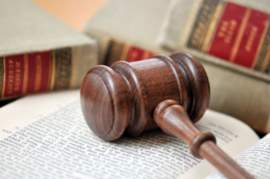
Facts to Know About Meeting of the Creditors

Related Forms
Certification of Judgment for Registration in Another District
Certificate of Retention of Debtor In Possession
Certificate of Commencement of Case
Certification of Notice to Individual Consumer Debtor(s)
Certification to Court of Appeals
Notice to Individual Consumer Debtor
Notice of Need to File Proof of Claim Due to Recovery of Assets
Notice to Creditors and Other Parties in Interest
Notice of Transfer of Claim Other Than for Security
Order Finally Approving Disclosure Statement and Confirming Plan
Order and Notice for Hearing on Disclosure Statement
Order on Reaffirmation Agreement
Order on Reaffirmation Agreement
Order for Relief in an Involuntary Case
Subpoena in a Case Under the Bankruptcy Code
Subpoena in an Adversary Proceeding
Subpoena for Rule 2004 Examination
Summons and Notice of Trial in an Adversary Proceeding
Summons and Notice of Pretrial Conference in an Adversary Proceeding
Summons in an Adversary Proceeding
View AllAs discharging and reorganizing debts is the whole point of bankruptcy, creditors must be kept informed at all stages of bankruptcy proceedings, as they most definitely have an interest in the case.
After being served with initial notice of the debtor filing for bankruptcy, creditors will gain notice of the formation of a bankruptcy plan through a preliminary court proceeding known as a meeting of the creditors or creditors' meeting. Certainly, a meeting of the bankruptcy creditors is less formal than adversary proceedings in bankruptcy, and depending on the circumstances of the case, the whole operation may take a relatively short time.
That said, for the individual debtor, a creditors' meeting is an inescapable fact of the process. Moreover, though the debtor may not be accused of a crime within a meeting of the creditors, he or she must be prepared to defend his or her case. The following are some notes about the importance of a creditors' meeting in bankruptcy court:
Compared with other stages in a debtor's request for relief through bankruptcy, creditors play a decidedly large role in impacting the outcome of a case. Meetings of the creditors, as held in court, are conducted with due alacrity after the initial petition is submitted by the debtor.
Depending on the chapter under which one files for bankruptcy, the exact deadlines for holding a creditors' meeting may vary, but barring extensions, it should take place sometime between 20 and 35, 40 or 50 days after receipt of the petition, as specified by the Federal Bankruptcy Rules of Procedure.
As opposed to the confirmation hearing that puts a rubber stamp on the debtor's confirmation plan, a first meeting of the bankruptcy creditors is directed not by a bankruptcy court judge, but by an official U.S. trustee or credible representative thereof.
Within the creditors' meeting, alongside serving essentially as the referee of the proceeding, the appointed trustee must ask pointed questions of the debtor, primarily to gauge their understanding of their rights and responsibilities in these matters, as well as to assure that all assets and documentation is accounted for.
Meanwhile, pursuant to their best interests in bankruptcy, creditors will direct their own questions, comments and reservations at the debtor. Particularly in Chapter 13 cases, where properties are being reorganized as opposed to being liquidated, creditors will want to know they are getting the same value they would otherwise get if a Chapter 7 case were processed.
In certain more rare cases, the meeting of the creditors will not have the same resonance. For instance, in a Chapter 9 municipality reorganization, the role of the bankruptcy court will be much diminished, and with so many potential creditors, there will not be a formal creditors' meeting. The only scenarios under which creditors may convene is a creditors' committee, and even then, their statute is limited.
NEXT: Federal Rules of Bankruptcy Procedure





















